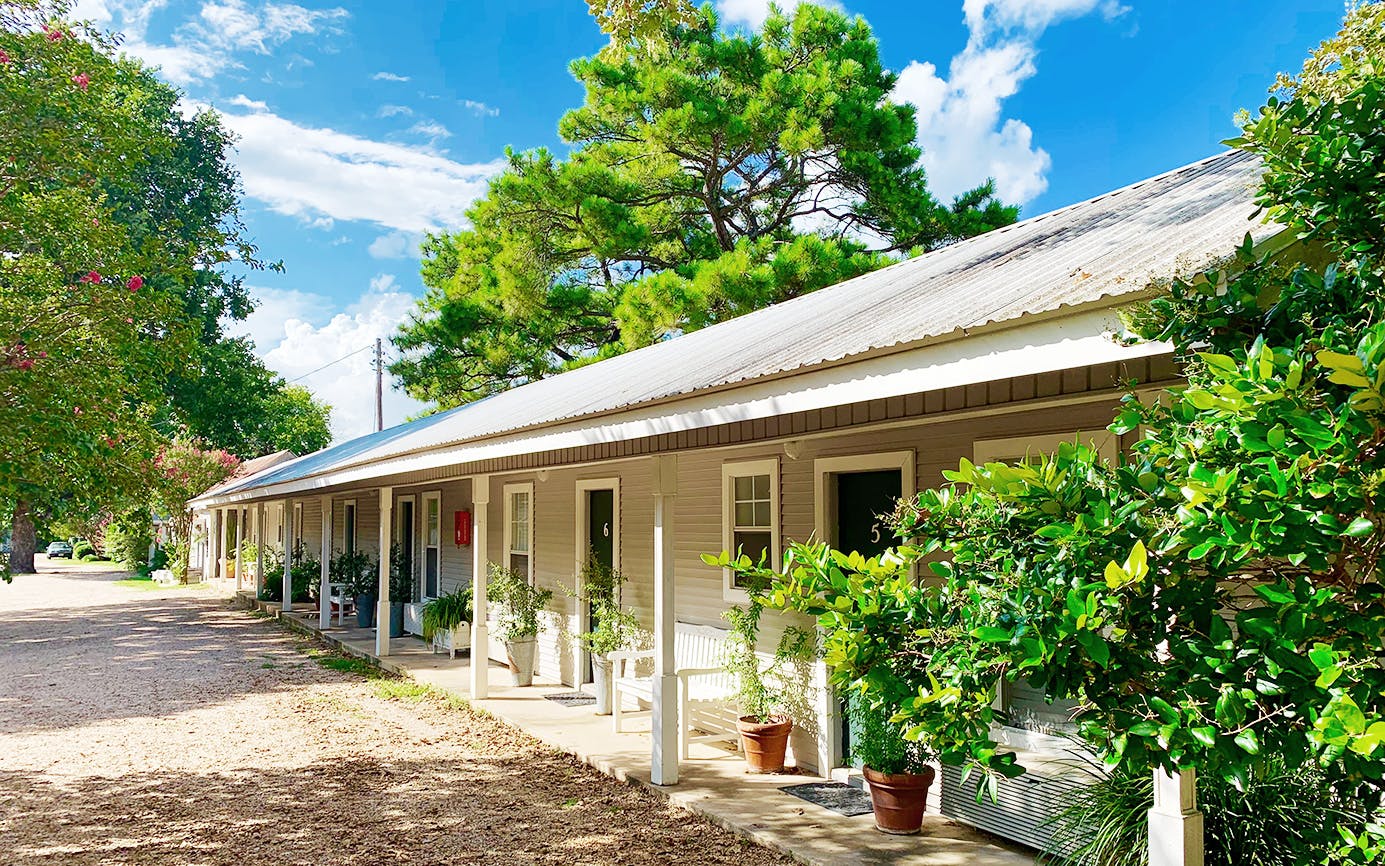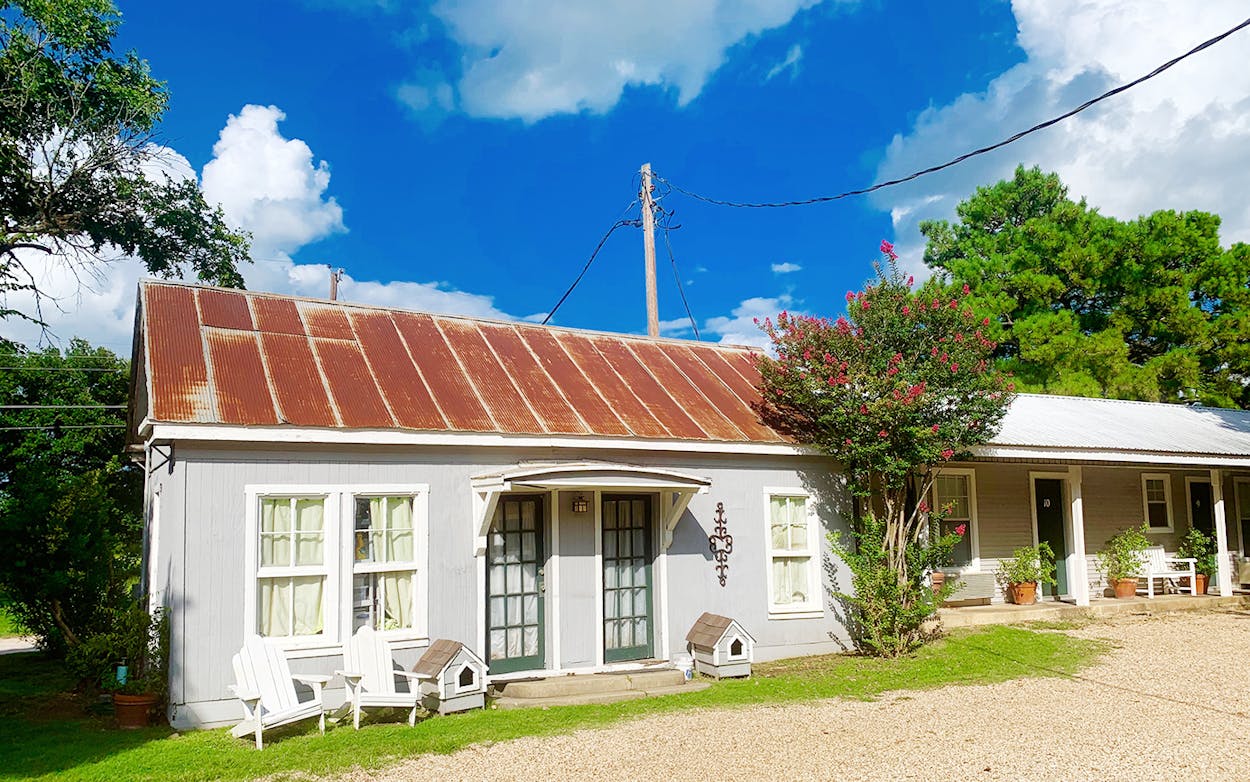As a rule of thumb when planning a trip, most of us consider the destination first and then select places to stay and eat. Rockdale, about 65 miles north-northeast of Austin, is one of those spots that inverts that approach: the food and the lodgings are the destination.
Visitors travel to Rockdale specifically to feast on barbecue—at both Brett’s Backyard in town and Snow’s in nearby Lexington (a recent Texas Monthly readers’ choice bracket put them head-to-head for the best in the state, with the latter coming out on top)—and to stay at the historic Rainbow Courts Motel. There’s not much else to do.
Tell big-city Texans you’re going to Rockdale, and some will ask you where it is, while others will jokingly tell you “don’t go back to” Rockdale. (By the sixth time you hear this reference to an old REM tune from a friend, your polite smile will be frozen in place.) Sadly, the song’s plaintive “You’ll wind up in some factory” lyrics likely hit too close to home for many Rockdale natives.
For about fifty years, Rockdale was a company town. Specifically, Alcoa. The company’s aluminum smelter, along with the huge nearby Luminant coal-fired power plant built to keep that humming along, doubled the town’s population (from about 2,500 to today’s 5,500 or so) soon after opening in 1952 and provided high-paying manufacturing jobs for the next 56 years. The smelter’s closure in 2008 and the subsequent shutdown of the coal plant early last year have left the town reeling in search of a new economic engine.
They’ve tried everything from a stab at Bitcoin mining to a hail Mary pass to Jeff Bezos, but today Rockdale is neither a cryptocurrency hub nor the home of Amazon’s HQ2. Instead, those who haven’t moved away now work in oil patches far from home or undertake long commutes to jobs in Austin or Bryan–College Station. Signs of decline are visible: vacant houses abound on some backstreets, the old City Cemetery is overgrown with weeds (though it’s also filled with beautiful Victorian headstones), and since 2005, there’s been an H-E-B-size hole in the strip mall on U.S. 79/Cameron Avenue, Rockdale’s main drag. (Locals now have only Brookshire Brothers and a Walmart Supercenter for groceries.)
Rainbow Courts, one of oldest motels in Texas, was already an institution when Alcoa came to town, and it will likely live on to see whatever comes next for Rockdale. When it first opened, as World War I was drawing to a close, Rainbow Courts was more of a campsite, just an oak-shaded spot on the side of an unpaved road on the edge of a mining town. Founder Monroe Bullock first described it as an “oasis.” By the late thirties, Monroe’s brother Ira had taken over (Ira’s granddaughter Joan Ratliff owns the place today with husband Dan), and canopied picnic tables had evolved into cottages. Over time, detached cottages with carports melded into rows of rooms. The old oaks that the dwellings were built under and around grew mightier and were joined by pecans. The trees cast long shadows over the deep green lawns now dotted with prize-winning lilies. U.S. 79 got a blacktop, but the little driveways of the motel are still gravel. Even as Rockdale boomed with Alcoa’s arrival, Rainbow Courts never lost its essential identity.
Meanwhile, the nature of motor hotels across America changed dramatically. Forested grounds were paved over as cities swallowed old tourist courts whole and spat them back out as havens for all manner of illicit behavior. Tall fences were built around them, both to conceal the identities of these “no-tell motel” guests and to protect them from parking lot thieves. Common areas came to be dreaded, and for the sake of convenience and safety, most postwar motels opened on the outskirts of towns.
So today we have the United States of Expedia, one nation of generic low-rise motels with names like Budget Suites Guest Lodge Best Inn. Guests of such places count themselves lucky to find a Waffle House or truck stop travel center within walking distance on the same side of the eight-lane highway, amid acres of anarchic parking lots and pedestrian-averse streets with names like “Conference Center Boulevard,” “Fulfillment Lane,” and “Target Way.” To be sure, there are benefits to this new order: in-room cable TV and Wi-Fi, clean sheets and comfy beds, cold AC and hot showers, complimentary toiletries, and cheap rates.

And here is the magic of Rainbow Courts: it is on the short list of motels not just in Texas but across America that offers all those amenities and historic charm. Did a bourbon-sweaty Bob Wills ever trade a stack of 78s for a room at your nearest Hampton Inn? Did Tennessee Williams ever pace the floor of room 108 at the Scottish Inn off the Interstate? Nope and nope, but both of those American legends did spend the night at Rainbow Courts.
Its character is of the same uniquely Texan tin-roofed, pecan-shaded, granny-and-ice-cream-on-the-front-porch variety seen in one of those vintage, soft-focus Blue Bell commercials from back in the day. Small wonder that this January, for the fourth consecutive year, Rainbow Courts was named one of TripAdvisor’s 25 best bargains. (The Shamrock Country Inn, where rooms are only $38, was the only other Texas hostelry to make the cut.)
Again, aside from the barbecue, there’s not a whole lot to do in Rockdale. The old International & Great Northern railway depot has been restored, and it’s a beaut. (Open only on weekends, it’s the town museum and visitors center.) The town was the birthplace of bluesman/early rock-and-roller Pee Wee Crayton and the hometown of both L. Ron Hubbard’s widow and George Sessions Perry, whose hardscrabble agrarian novel Hold Autumn in Your Hand won a Texas Institute of Letters award in 1941 and was similarly lauded the following year by the American Booksellers Association. (The late, great Texan man of letters Don Graham praised Perry’s now all-but-forgotten work and discussed his tragic life in our pages in 1999.)


The Milam County seat of Cameron is worth a look-see, especially for its three-story, 1892 Renaissance Revival courthouse and hulking red-brick castle-like former county jail, now a historical museum. However, much of the area’s rich and millennia-long history lies beyond the reach of modern memory, strewn as it is along El Camino Real de los Tejas, a relatively new national historical trail. El Camino Real traverses the county on a southwest-northeast axis as it wends its way from Ciudad Guerrero in Mexico to Natchitoches, Louisiana. As the name suggests, this was once a royal road connecting Spanish outposts. Archaeologists believe that the descendants of the conquistadors followed in the tracks laid down by Native Americans, who in turn were following buffalo herds.
The motel’s Ratliff hopes that Milam County’s pre-Columbian past will one day become a part of its economic future. “We had three mission sites and a Spanish fort in the 1700s,” she says. “That’s pretty amazing considering we’re a relatively small county. Those missions are no longer standing but there are still a lot of artifacts being found in professional archaeological digs.”
The Spaniards were so attracted to the area because it was already the site of what has come to be known as the Rancheria Grande. “That’s where hundreds of tribes of Indians met for what I call their annual convention, their annual meeting, their annual get-together, which was really important,” Ratliff says. “Thousands of Native Americans would gather. There’s a mountain that they would gather on, and of course, we have a lot of water here, a lot of rivers, and that was important to them. So this was an opportunity for them to trade and also arrange marriages.” (That peak she mentioned—Sugarloaf Mountain—is something like the Enchanted Rock of eastern Texas. The Tonkawa Indians consider it their birthplace. There was a persistent legend of a trove of Spanish treasure concealed in a cavern. Aggies have trespassed on the private property on which it looms to enjoy the views and pose for photos.)
Work on the Rancheria Grande site has already begun. Archaeologists have found artifacts dating from the failed eighteenth-century Spanish attempt at settlement (all three missions and the presidio failed, their surviving inhabitants pushed back down El Camino Real to San Antonio by disease and hostile Lipan Apache and Comanche attacks) all the way back to Paleo-Indian times. Twelve thousand years ago, these gatherers of pecans and plums and hunters of bison, mastodons, giant sloths, and camels roamed through Central Texas.
“That’s going to be a huge dig,” Ratliff says. “They’ve already started, and we’re going to be hearing a lot more about that.” Right now, aside from historical markers and relics in museums, most of Milam County’s prehistoric era is invisible to the untrained eye and off limits to tourists.
Even so, Ratliff and others believe the county’s economic future could rely on heritage travel and tourism. Perhaps one day there will be a Milam County interpretive historical park, along the lines of Cahokia Mounds, which sits just across the Mississippi River from St. Louis. But for now you’ll just have to use your imagination to conjure those ancient times. Luckily, such dreaming comes easy in the heavenly gardens of the Rainbow Courts Motel.
- More About:
- Snow's BBQ
- Bob Wills
- Rockdale







